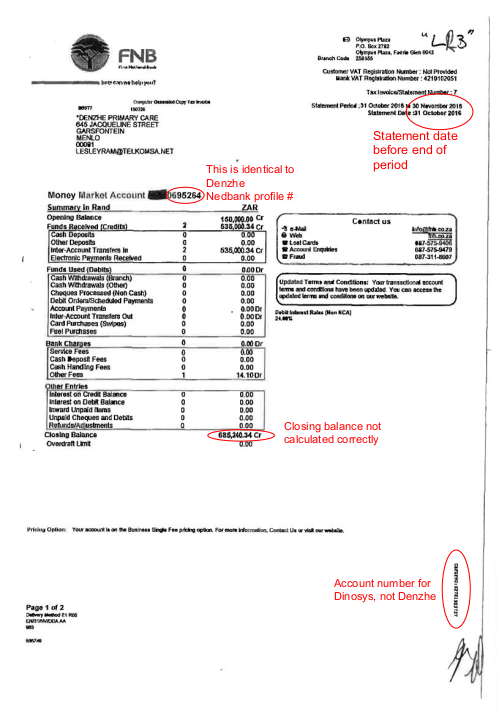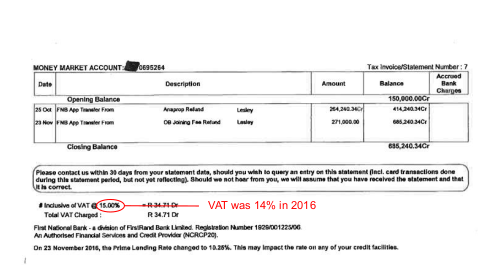Lotto looter Lesley Ramulifho has committed fraud and perjury
Affidavit contains manipulated bank statements and forged signatures
We expose how a recipient of tens of millions of rands of Lottery money committed fraud in a court affidavit. Photo: Ashraf Hendricks
Lawyer and Lotto looter Lesley Ramulifho has committed fraud, perjury and forgery in an affidavit lodged in his case against GroundUp.
His affidavit includes forged FNB bank statements and supplementary affidavits, one definitely forged and one probably forged.
A criminal complaint has been laid with the police against the Pretoria lawyer by attorney Jacques Louw, who represents GroundUp, GroundUp’s editor Nathan Geffen, and this reporter.
A similar complaint has also been lodged with the Gauteng branch of the Legal Practice Council (LPC). In a cover letter submitted with the complaint to the LPC, Louw states that Ramulifho’s actions amount to “criminal conduct”.
Ramulifho has featured prominently in an ongoing investigation by GroundUp into alleged corruption and maladministration of questionable Lottery grants. We previously exposed how Ramulifho and people associated with him have received at least R60 million in questionable grants.
He is currently the subject of a criminal complaint that was laid against him in November 2016, which has not been fully investigated. In an affidavit sworn at the time, Takalani Tshikalange claimed that Denzhe Primary Care, a dormant NPO she had founded several years earlier, had been hijacked by Ramulifho. Denzhe was then used to access millions in Lottery funding, she said.
In a cover letter to the LPC, Louw says that we have laid a criminal complaint against Ramulifho with the police, and adds: “…the conduct of the attorney is of such serious nature and involves such a level of dishonesty, that I am of the view the Legal Practice Council may wish to take immediate and urgent action”.
And in a cover letter accompanying the complaint to the police, Louw says: “I am submitting this affidavit … relating to conduct … that my clients and I believe constitutes criminal conduct comprising fraud, forgery and perjury. We believe that Ramulifho created fraudulent documents. In some instances, our complaint is based on strong suspicion. In others, the probability of fraud and perjury are overwhelming.”
The documents at the centre of the two complaints were filed by Ramulifho as part of ongoing litigation, in which he is trying to interdict GroundUp, Geffen and Joseph.
In April last year, Ramulifho asked the Pretoria High Court to urgently order GroundUp, The Citizen and Daily Dispatch newspapers to remove all articles from their websites that make any reference to him. He also asked the court to order the publications to publish a retraction, and not to publish any further articles about him, pending further litigation.
All three publications opposed Ramulifho’s application. The judge ruled that the application was not urgent, and struck it from the roll. He also awarded costs against Ramulifho.
The complaint to the police and the LPC set out evidence of alleged fraud, forgery and perjury against Ramulifho, including that “in court papers and under oath” he
-
referred to documents which were fraudulently fabricated either by him or under his direction;
-
confirmed under oath that the fabricated documents reflected the truth when he would have known the falsity of the statement;
-
submitted a confirmatory affidavit purportedly from another attorney, Etienne Naude, in which Naude’s signature was forged; and
-
probably forged Tshikalange’s signature on an affidavit submitted to the High Court, contradicting her earlier complaint to the police.
The Naude affidavit relates to a GroundUp investigation that exposed how Ramulifho had allegedly used R5-million of the Lottery’s Denzhe funding to help pay for a luxury R11-million house he bought in an upmarket Pretoria “country estate”. Naude has denied any knowledge of the affidavit and says that he did not depose the affidavit and that it is not his signature on the document.
Also, bank statements submitted to the court by Ramulifho to support his claims were altered in an attempt to rebut some of GroundUp’s reporting.
Louw points out several indications that the statement has been altered. These include:
-
The period of the statement is 31 October 2016 to 30 November 2016, yet the statement is dated 31 October 2016.
-
When added up, the balance on the statement is incorrect. Automated bank statement systems do not make calculation errors.
-
The “inscription number” on the bottom of the statement, which is recorded on all electronically-delivered FNB accounts, reflects a different account number to the account number on the statement. In fact, the account number relates to Dinosys, another controversial Ramulifho-related company that received R10 million in Lottery funding to build toilets at some Eastern Cape schools.
-
The VAT and the prime lending rate recorded on the statement are incorrect for the period stated on the statement. For example the VAT is set at 15%, even though VAT was 14% at the time of the statement.
The complaints explain how Ramulifho used forged proof of payments to “prove” that he had repaid over half-a-million rand that Denzhe paid towards two Ocean Basket franchises he purchased in Gauteng.
But the dates of the proof of payment “receipts” submitted to the court by Ramulifho and those reflected on the doctored bank statement are different.
In the complaint to the police, Louw makes the point that it is limited to the fraudulent manipulation of the court documents by Ramulifho in his case against GroundUp. “We are of the view that it is for the prosecuting authorities to investigate independently the other crimes that may or may not have been committed.”
Ramulifho failed to respond to questions sent to him.
Here is the FNB bank statement attached to his affidavit. Red markings explain errors in the forgery.
Support independent journalism
Donate using Payfast

Don't miss out on the latest news
We respect your privacy, and promise we won't spam you.
Next: City removes occupiers from land earmarked for housing
Previous: Covid-19: “I decided to return to the robots because of hunger”
Letters
© 2020 GroundUp.
This article is licensed under a Creative Commons Attribution-NoDerivatives 4.0 International License.
You may republish this article, so long as you credit the authors and GroundUp, and do not change the text. Please include a link back to the original article.



